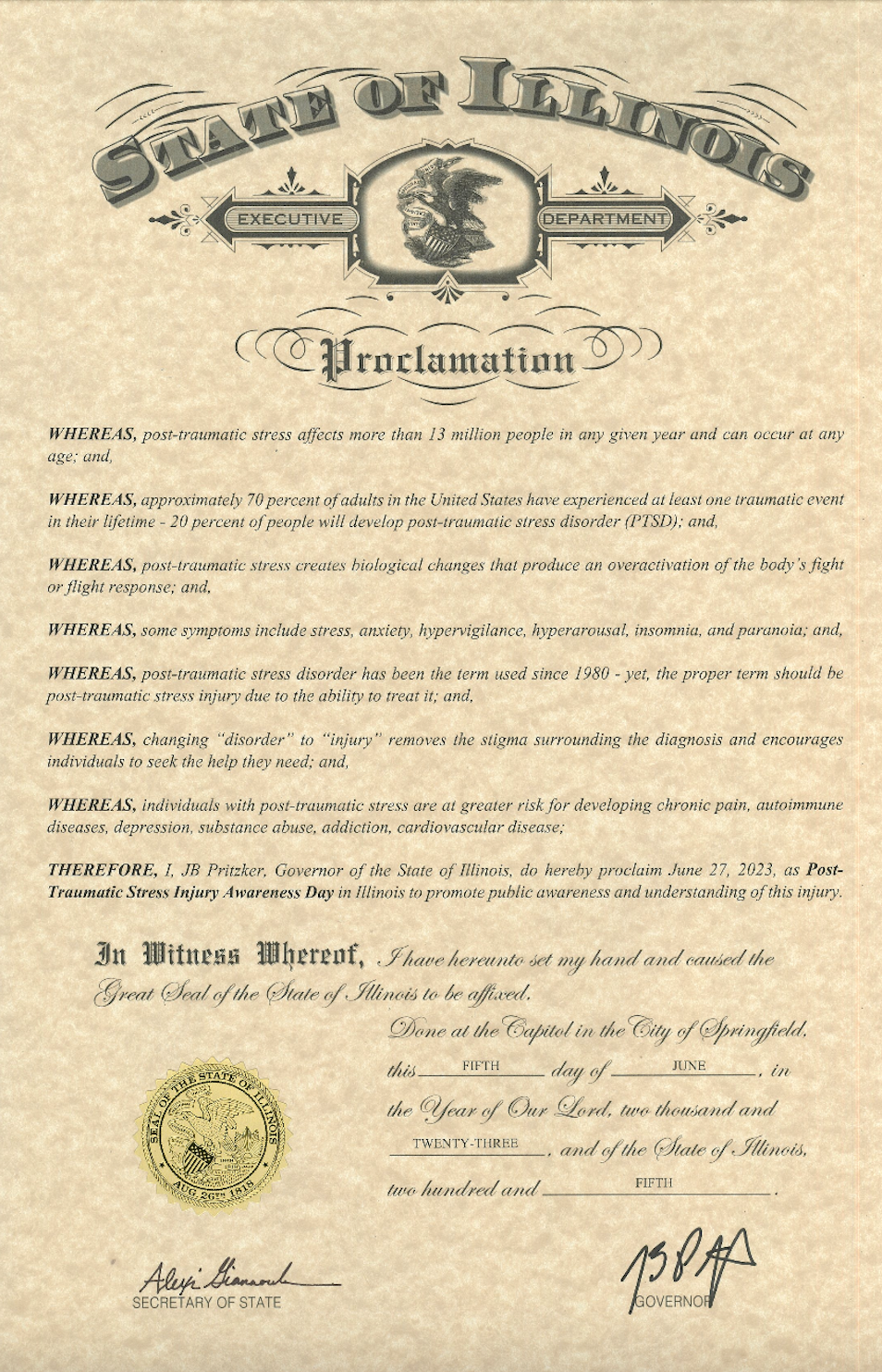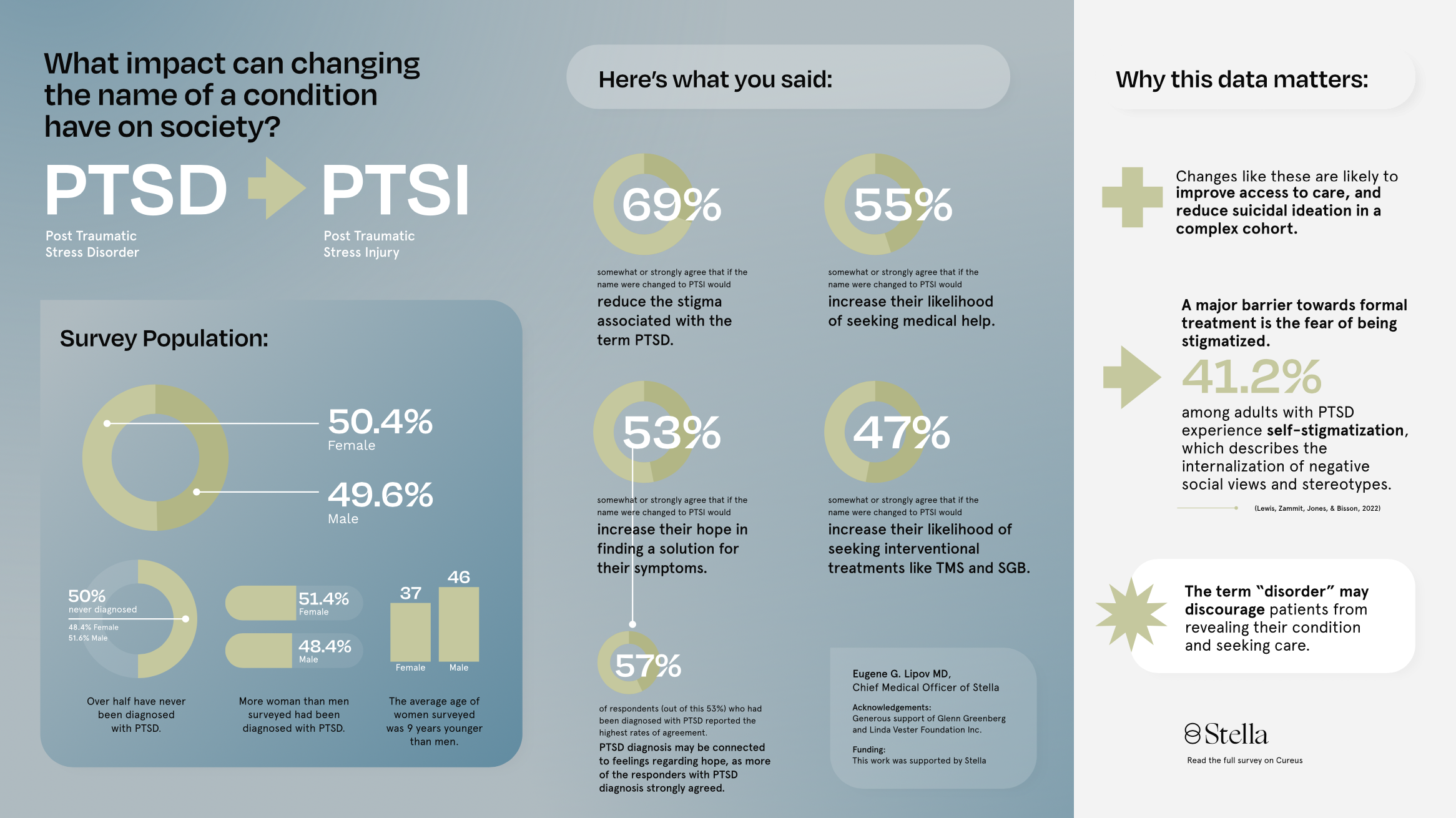Why does PTSD Awareness Day Matter?

If you think that you may be experiencing symptoms, take this PTSD test online or speak to a Care Advocate now directly by calling (908) 293-7559.
In the mental health world, stigmas often arise from a need to understand the challenges faced by those experiencing mental health issues. This uncertainty causes hesitation or avoidance to seek treatment that can effectively help and furthers individuals into the stereotypes of mental health challenges and emotional trauma like anxiety, depression, and post-traumatic stress.
There is no threshold for the types of trauma people experience, and because we undergo biological changes when we experience trauma, everyone will react in their own unique way. But because of stigmas and lack of support and resources, people that experience trauma remain unaware of the types of help they can receive.
Stella is leading the way in innovative and effective treatments for post-traumatic stress that identify post-traumatic stress as an injury. We believe that post-traumatic stress caused by an emotional trauma can trigger biological changes and over-activates the sympathetic nervous system.
Let's explore the language around PTSD, PTS and PSTI.
What is PTSD?
The most commonly used term is PTSD, or post-traumatic stress disorder, which is a psychiatric disorder that can occur in people who have experienced or witnessed a traumatic event.
What is PTS?
PTS, or post-traumatic stress, is used in the transition when moving away from the use of PTSD to PTSI.
What is PTSI?
PTSI, or post-traumatic stress injury, refers to the same set of symptoms as PTSD. However, while PTSD refers to a psychiatric disorder, the PTSI definition refers to a biological injury.
Why Language Matters
Stigmas around trauma can often keep people quiet and prevent them from seeking help or speaking out about their experiences. People who have experienced trauma may worry that others will judge or think less of them. Often, many experience shame or guilt surrounding their traumatic experience, which can create barriers to healing and recovery.
It's essential to create a more supportive and understanding culture where people feel safe to talk about their experiences and seek help when needed.
Many people experiencing post-traumatic stress are not diagnosed with PTSD and often do not recognize their signs and symptoms.
Most Police Officers cite reasons as the stigma and fear that seeking assistance is a sign of personal weakness, followed by fear of job loss or repercussions in the workplace.
Changing the Stigma
Around the United States, political and clinical leaders, along with advocates, are championing the name change.
In the Spring of 2023, Illinois Governor released a proclamation recognizing June 27, 2023, as Post-Traumatic Stress Injury Awareness Day, promoting understanding and awareness of the challenge, its symptoms, and the treatments to bring relief to those in need.
In effort to solidify this thinking for future generations, the General Assembly in Illinois has also submitted Illinois HB2805. This bill Amends the State Commemorative Dates Act and provides that June 27 of each year is to be recognized as Post-Traumatic Stress Injury Day.
This is all in hopes of bringing awareness to the brave men and women who received post-traumatic stress injuries while risking their lives to protect our freedom, health, and welfare and to recognize those who have suffered post-traumatic stress injuries for their gallantry, commitment, devotion, and sacrifice for our communities.

In an effort to reduce those stigmas and improve access to care, Stella's Chief Medical Officer, Dr. Eugene Lipov, has proposed renaming PTSD as post-traumatic stress injury (PTSI). A recent study conducted by Stella between August 2021 and August 2022 explored the potential impact of this name change.
The results, posted on Cureus during Mental Health Awareness Month, confirm this theory.

In recent years, more people are coming forward to share their stories of how their trauma impacted their mental health, resilience, and healing –– raising awareness and establishing an open environment where individuals are open to discuss their experiences.
Michelle Obama has spoken about her experience with low-grade depression during the COVID-19 pandemic, which she attributed to sadness and anxiety over racial tensions, political divisions, and the pandemic's toll. Obama has stressed prioritizing one's mental health and finding relief during times of difficulty.
"Sadly, too often, the stigma around mental health prevents people who need help from seeking it. But that simply doesn't make any sense. Whether an illness affects your heart, your arm, or your brain, it's still an illness, and there shouldn't be any distinction…we should make it clear that getting help isn't a sign of weakness — it's a sign of strength — and we should ensure that people can get the treatment they need." - Michelle Obama
Ariana Grande was left with emotional scars after a terrorist attack at her concert in 2017. Since then, she has been open about her struggles with anxiety and PTSD and has used her platform to raise awareness about mental health.
"...but in all honesty, therapy has saved my life so many times.
If you're afraid to ask for help, don't be, u don't have to be in constant pain & u can process trauma. I've got a lot of work to do, but it's a start to even be aware that it's possible." - Ariana Grande
Members of the BIPOC (Black, Indigenous, and People of Color) communities and other minority groups often face disproportionate inequities in care, support, or mental health services in this country. As a result, they are significantly more likely to develop mental health conditions.
One of the significant barriers to mental health treatment is access and the need for understanding mental health support.
Listen to three three mental health care advocates to discuss the struggles of their communities, the stigmas they still face and the changes they hope to see.
Future Relief For Symptoms
Though trauma affects individuals differently, seeking help is crucial for healing, and the stigmas surrounding trauma can often prevent individuals from speaking out or seeking support. But there are many avenues that one can take to help with healing, like talk therapy, medication, and journaling.
In recent years, Stella has started to pave the way for fast and effective relief from trauma with the Dual Sympathetic Reset, an advanced version of the Stellate Ganglion Block (SGB), Ketamine Treatment and Integration Sessions, and Trauma-Informed Talk Therapy Curriculums.
Some evidence has shown that it can efficiently reduce symptoms of trauma, like hypervigilance, trouble sleeping, and anxiety, that can lead to suicidal ideations.
It can be time-consuming and arduous, but relief from the debilitating symptoms of trauma is possible. Individuals sharing their experiences and advocating for mental health challenges and emotional trauma solutions have raised awareness and created a more supportive culture.
By continuing the openness, we can work towards creating a more understanding and compassionate mental health community for those who have experienced trauma.
If you want to learn more about Treatment by Stella or schedule an assessment with our trauma-informed Advanced Practice Providers, call our Care Advocate Team now: (908) 293-7559.